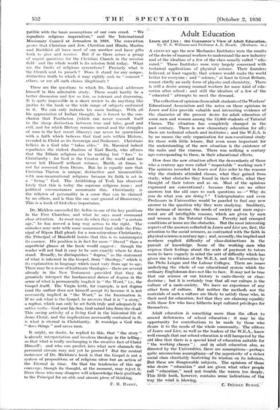Learn and Live : the Consumer's View of Adult Education.
By W. E. Williams and Professor A. E. Heath. (Methuen. 5s.)
Adult Education
Learn and Live : the Consumer's View of Adult Education. By W. E. Williams and Professor A. E. Heath. (Methuen. 5s.) A CENTURY ago the new Mechanics Institutes were the results of the desire of manual workers to understand the new industry and of the idealism of a few of the class usually called " edu- cated." These Institutes were very largely concerned with technical applications of physical science. Their founders believed, at least vaguely, that science would make the world better for everyone ; and " science," at least in Great Britain, meant chiefly an early form of physics and chemistry. There is still a desire among manual workers for some kind of edu- cation after school : and still the idealism of a few of the " educated " attempts to meet the demand.
The collection of opinions from adult students of the Workers' Educational Association and the notes on those opinions in Learn and Live provide valuable and interesting evidence of the character of the present desire for adult education of some men and women among the 13,000 students of Tutorial Classes. The situation has completely changed in the past century. There is now elementary education for all ; there are technical schools and institutes ; and the W.E.A. is by no means the only organisation for non-vocational study for those with little leisure. But even more important for the understanding of the new situation is the existence of the radio and the cinema. There was nothing a century ago corresponding to these, in their educational effects.
How does the new situation affect the descendants of those who a century ago were called " respectable " working men ? The opinions recorded in Learn and Live refer to the reasons why the students attended classes, what they gained from study, what obstacles they found in their efforts, what they thought of their tutors and so on. Most of the opinions expressed are conventional ; because there are- no other answers but the old ones to such questions as—" Why do you do what you are doing ? " Undergraduates and even Professors in Universities would be puzzled to find any new answer to the question why they were studying. Snobbery, the increase of income, the needs of society and mere enjoy- ment are all intelligible reasons, which are given by men and women in the Tutorial Classes: Poverty and cramped conditions at home are the obstacles. But the most interesting aspects of the answers collected in Learn and Live are, first, the attention to the social sciences, as contrasted with the faith in physical sciences a century ago ; and, secondly,. the implied and nowhere explicit difficulty of class-distinctions in the pursuit of knowledge. Some of the working men who express their feelings about the scale of payment to tutors seem to have vaguely in mind the sort of difficulty which has given rise to criticism of the W.E.A. and the Universities by the Plebs League and the Labour Colleges. There are issues underlying the whole of our educational system which the ordinary Englishman does not like to face. It may not be true that our science or our history is caste-theory or class- doctrine ; but it is certainly true that all our culture is the culture of a caste-society. We have no experience of any Other form of culture. But neither the methods nor the materials of such a culture are likely to satisfy those who, in their need for education, feel that they are claiming equality with those few who have hitherto kept cultural privileges for themselves.
Adult education is something more than the effort to amend deficiencies of school education : it may be the opportunity for contributions to be made by those who desire it to the needs of the whole community. The editors of Learn and Live, as well as the leaders .of the W.E.A., know well enough that our school education is still hampered-by the old idea that there is a special kind of education suitable for " the working classes ") and in adult education also, as directed by the Universities, there are assumptions—perhaps quite unconscious assumptions—of the superiority of a richer social class charitably bestowing its wisdom on its inferiors.
Out these are disagreeable subjects. The opinions of those who desire " education " and are given what other people all " education," need not trouble the waters too deeply. - This little boOk, 'however, contains some 'indications . of the way the wind is blowing. lit7its.-4;










































 Previous page
Previous page